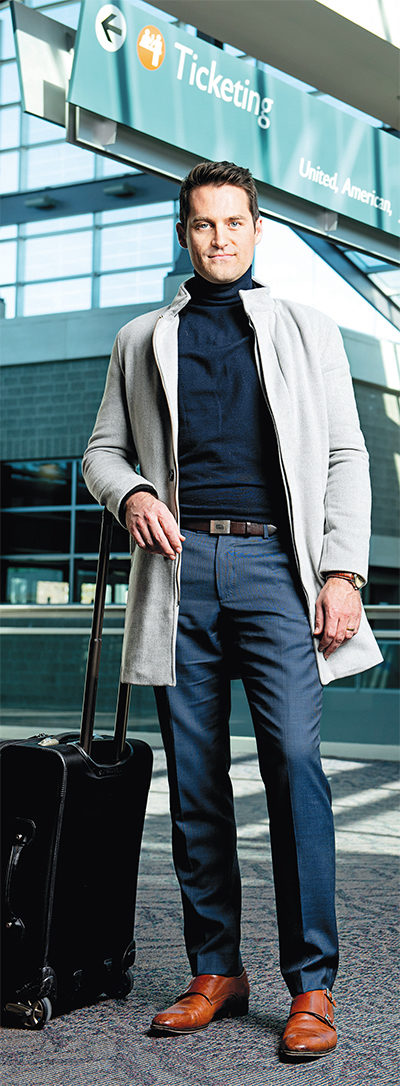
Ben Chevrette is Babson’s director of regional and international advancement.
Photo: Webb Chappell
Ben Chevrette is the very definition of a frequent flyer. As Babson’s director of regional and international advancement, he wings around the world, meeting with members of the College community to raise support for the institution. “I travel extensively, from South Africa, to many spots in Asia, to Europe, to Latin America,” he says. “There is no place we don’t have alumni and supporters of the College.” While all the traveling is exciting, Chevrette confesses to being a homebody. When not on the road, he likes spending time at home or on campus, where he often eats in Trim Dining Hall. “I see the students,” he says, “and I’m reminded what this is all for.”
Where have you been lately?
I just returned from India. You can’t find two places that are more different than Mumbai and Wellesley. I am reminded that our students from India have to adapt to a new culture, a new style of learning, and they excel. That’s a testament to the students we attract. And it’s a testament to my colleagues at Babson. They have created a welcoming environment, where students from any part of the world can excel.
What kind of reception do you receive during your visits?
There is red-carpet treatment for any Babson representative who travels internationally. People invite me to their homes, to their clubs, and introduce me to their families. I’ve never experienced a warmer reception. I’ve met with heads of state and CEOs of multinational corporations. The energy people have for this College is amazing.
How is that energy translating into support?
Babson’s average fundraising amount internationally used to be about $1.5 million a year. Last year, we raised $13 million.
What do you like about your job?
I have found a career in which I meet people and help them realize the type of impact they want to have. That’s rewarding. I think of Babson as a platform. People invest here to make change. There is no cause you can’t impact with Babson as your vehicle. Global health issues. Climate change. Really, anything. If you care about hunger, you can give to a food bank, and that will give food to people. That’s noble. But you can give to a school like Babson that trains entrepreneurs, who may address the causes of global hunger and find solutions. – John Crawford
Didn’t you almost go into music as well? I was a double major in finance and piano in college. I had a minor in musical composition, too. When I came out of school, I thought, “Do I pursue business or continue with music?” I had two equal loves, and unfortunately, you have to make a choice. I wanted to write music for movies, but if I wanted to study film composition, I would have had to go to California for film school. I decided to stay with finance.
Do you still play piano? Not as much as I desire, but I do want to own a Steinway concert grand piano one day.
Tell me about living in Taiwan. My parents are originally from Taiwan. I always wanted to experience the culture there. So I went to live in Taipei. I studied Mandarin for almost a year and taught English on the side. It was one of my greatest experiences. The people are friendly, it’s affordable, and the food is amazing. I traveled around and ate out for almost an entire year, trying all the different dishes.
What comes in a LobstahBox? We’re selling the full experience. A classic LobstahBox includes the crackers and picks, Wet-Naps, cooking directions, and place mats that have instructions on how to eat the lobsters. We only source from Maine, and we guarantee the lobsters’ freshness. It all ships overnight in a cooler with frozen gel packs to keep the lobsters cool. That’s the key. If you order by 11 a.m. Eastern, you’ll get it the next day.—John Crawford
]]>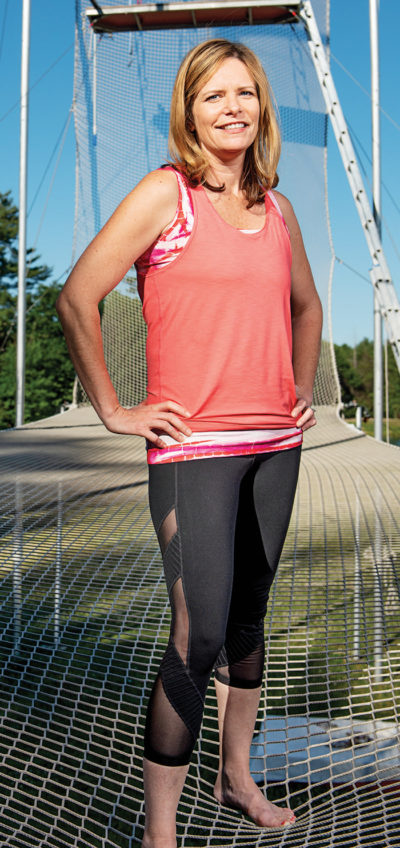
Photo: Webb Chappell
Lauren Belmont, associate director of Academic Technologies
What was your first job? I worked for The Home Depot’s corporate office near Atlanta. They wanted young, creative people to help them design training courses for store employees. I’d put on an apron and work alongside associates who had been there for 20 years and knew every single type of drill bit, fastener, and saw, and I learned extensively about the products myself so that I could design the training.
How did you come North? It was the dot-com boom, and I had a surprising number of job offers from all over. But one was from the Boston area, where my brother was living at the time. He said it’s a great place for young people in technology, and the company paid for my relocation.
When did you come to Babson? In 2005. I was married, and we wanted to start a family—I have three girls—but the company I was working for was small and didn’t have any maternity leave. I talked with HR, and they were nice but not open to any flexibility in my schedule. Babson has been really flexible with me in terms of work-life balance. They made it work in a way that I feel a lot of companies don’t for women.
What are your job responsibilities? I still do some course design and content development, but I’m probably more focused right now on curriculum and production, just because there are so many programs that we’re involved with. I also focus a lot on faculty training, which I love.
What are your hobbies? I’m definitely one of those people who has my Kindle with me all the time. I love historical fiction, particularly anything about World War II or the Civil War. And I’m sort of a thrill-seeker at heart, so you can often find me at Revolution Trapeze in Stow. I started to do flying trapeze a few years ago. It seemed like a good adrenaline rush—and it really is.—Donna Coco
]]>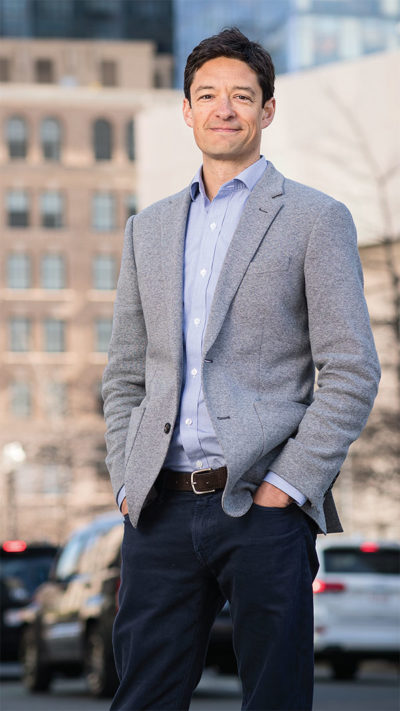
Photo: Tom Kates
David Zuckerman, MBA’18
After studying biology in college, David Zuckerman, MBA’18, was a researcher for a pediatric oncologist at Dana-Farber Cancer Institute in Boston. Turns out the molecular techniques he was using were sought after by the Centers for Disease Control and Prevention, which hired him to research responses to bioterrorism and set up a lab in Los Angeles. Three years later, in a complete 180, Zuckerman became an investment manager at Merrill Lynch. Family ties, however, eventually pulled him and his wife (and two boys) back East. Now he is in the health-care industry again, working in Boston for Pear Therapeutics, developer of the first FDA-approved app for treating substance abuse.
How did you go from bioterrorism research to investing?
My work at the CDC was really interesting. I got to work with anthrax and smallpox and plague. It was exciting and dangerous. But my next step would have been applying to medical school or getting a Ph.D., and I didn’t want to do either. I always had an interest in the markets and had a connection to an investment group at Merrill Lynch that offered to bring me on if I got my licenses. I stayed with that team until we left California.
Tell me about Pear Therapeutics.
We’re building prescription digital therapeutics, which is a fancy way of saying apps for patients. The first one is for substance use disorder, which is a huge issue all over the country. Patients are prescribed the app along with face-to-face therapy. The app delivers therapy through a mobile device via a series of lessons based on cognitive behavioral therapy. The app includes incentives to do the lessons, and it can report on the patient’s status. Another differential for us is we’ve built a clinician dashboard, so the clinician can see in real time the patient’s progress, cravings, and triggers.
When will it launch?
Mid-2018. We’re building out our pipeline of other products at the same time.
Why get FDA approval?
The FDA asked us the same thing. We have this incredibly strong clinical data and want to make claims that show we can help patients increase abstinence. Now we’re a defined treatment that can be prescribed and not just an app that we hope people download.
Was it hard leaving California?
We had a little apartment seven blocks from the beach in Santa Monica. It was a really great place. We were away from the East Coast for 10 years. I don’t regret a second of it. But it’s nice coming home.—Donna Coco
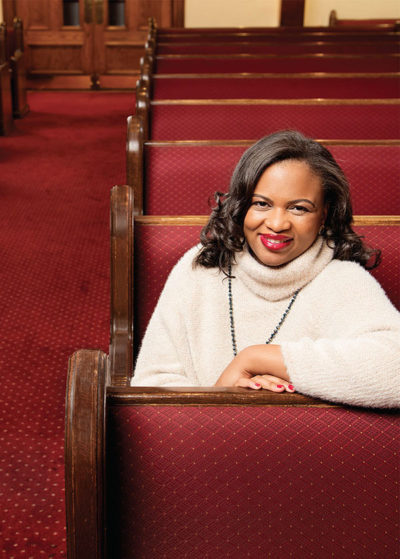
Photo: Webb Chappell
Wiljeana Glover, assistant professor of technology and operations management
When Wiljeana Glover was in college, a beloved aunt died due to a medical error. That tragedy led Glover to start thinking about health-care operations, an area that would become a focus of her career. Today, Glover is an assistant professor of technology and operations management and the faculty director of Babson’s Schlesinger Fund for Global Healthcare Entrepreneurship, a multifaceted initiative involved in research, student programs, and educational activities.
In addition to her efforts in health care, she also fills her days with praise and music. A singer and songwriter, Glover enjoys serving as the director of worship and arts at her church, Pentecostal Tabernacle, in Cambridge, Massachusetts.
You’re originally from Georgia. What do you like about Massachusetts?
My husband is a psychologist, and we jokingly call Boston the mecca of all things health care. So I think me being a health-care researcher, him being in the field, you can’t really be in a better location to learn and be challenged and be innovative. We love it.
Can you describe your research?
I study health-care systems and the intersection of operational strategies and the human perceptions of how well those operational strategies are going. When a hospital decides to try a new business model or approach to operations, I’m interested in how does that align or not align with the culture of the organization. What are the human implications? Are people excited about this, do they feel empowered by it, or do they feel limited by it?
Your work looks at integrating care. What does that mean?
I think in part I’m influenced by what happened to my aunt, a situation where one care provider had a piece of information that her surgeon didn’t have. That started me thinking about how you better coordinate care. How do you coordinate all of the players, all of the departments that need to be involved?
Medicine may be a big part of your life, but so is music.
A lot of faculty members here have an artistic or creative side. My creativity has always been in music. There are recordings of me making up songs when I was 3. And so I’ve always been a songwriter and a singer, and that’s something that I am blessed to be able to do at my church.
Tell me about your church.
I love that my church is extremely diverse. It’s a really eclectic mix of people, which forces you to think about life and faith in a very different way because everyone is coming from a different cultural background. We have a lively service. Lots of clapping, lots of singing along. A local reporter came to a service, and she said she could feel the ground moving under her feet.—John Crawford
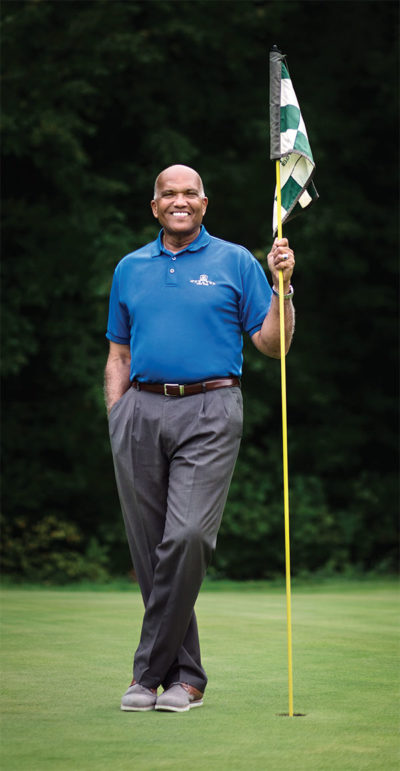
Photo: Ryan Donnell
Henry Turner, MBA’89
How’s your golf game? Do you play a lot?
I don’t. I’m just starting to pick up the sport now. I actually bought the course for land development. But after buying it and seeing its value to the community, I decided to keep it. My wife is from Mississippi. In the early 1990s, we were looking for property to build a house there. A Realtor was showing us around. It was a very nice neighborhood with a golf course. I said, “I want to go over there and play.” He said, “You won’t go over there and play at that golf course.” I forgot I was in Mississippi. Now I don’t need that golf course. I have my own. We are open to everyone. Our fees are the lowest in the area.
What are your hopes for Marlton?
I want the younger population to realize that business owners use the golf course as a way to conduct high-level business. There is not one deal struck on the football field or basketball court. Every day there is a business deal struck on the golf course.
What has the military meant to your family?
Our father spent over 30 years in the military. He started in the segregated army, got his optometry degree, and went back into the Army as an optometrist. The military gave him an opportunity, an opportunity the rest of society didn’t give minorities. My two brothers and I went to West Point, my sister went to the Naval Academy. All of us spent 20-plus years in the military. The military is a wonderful thing. It paid for our education. My wife, Winifred, served 22 years in the Army and retired as a lieutenant colonel. Our oldest son is a major in the Army. Service is important to our family. So much has been given to us. There comes a time when you have to give back.
What’s an essential lesson the Army taught you?
If you take care of your soldiers, your soldiers will take care of you. That’s the biggest thing I learned in the military. And I took that into the civilian world. If you take care of your employees, your employees will take care of you.—John Crawford
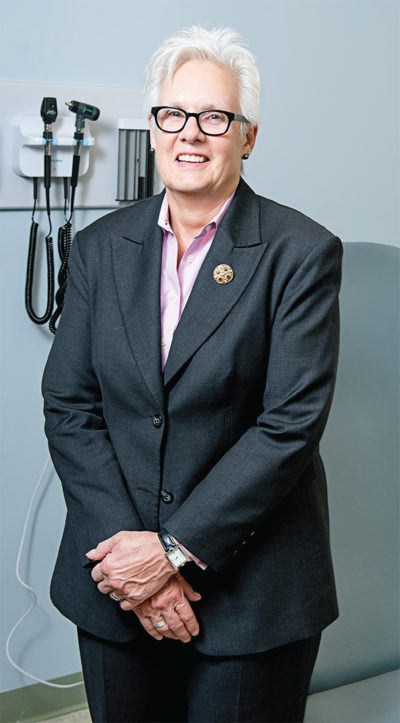
Photo: Webb Chappell
Sharon Yardley
Why did you leave criminal justice? I worked with youthful offenders and did classification of inmates, and I loved it. This was way back in the ’80s, when Governor Dukakis went out of office and Ed King came in. King changed it so that anybody who had eight years or more to serve on their sentence would go to maximum security. My co-workers and I had strong feelings that if you mix youthful offenders with the regular population, they just come out worse. So I decided law wasn’t for me.
Why nursing? My sister, Sally, who is five years older than I am, became a nurse and spent her entire career at Children’s Hospital. She was my idol growing up. I wanted to be just like her. But I was one of those people who never buckled down in high school. I applied to nursing school and was not accepted. I wanted to be Nancy Drew anyway, so I decided criminal justice would be great. After leaving corrections, I moved with a friend to Tennessee. Years later, there was a shortage of nurses. So I ended up earning my master’s in nursing from Vanderbilt. Now I’m working on my doctorate from Regis College.
A passion outside of nursing? I love photography and travel. I’ve had the privilege of traveling with Babson to El Salvador to work with Habitat for Humanity eight times, and I’ve been to Rwanda once and Tanzania twice. In Africa, we teach entrepreneurship. The kids are amazingly smart. They’re taking that information and actually starting businesses and making money and helping support their families.
I went early this year to Tanzania and spent three days camping in the Serengeti. We were having breakfast one morning, and it was the migration of the wildebeests, and zebras travel with wildebeests. They were running by to go into the grass to eat. It was such an amazing experience.
A takeaway from your travels? It always grounds me. In El Salvador, there is no indoor plumbing, and you can’t drink the water. Without clean water, people die. In our lives, we’re surrounded by so much good fortune. I find it brings me back to reality.—Donna Coco
]]>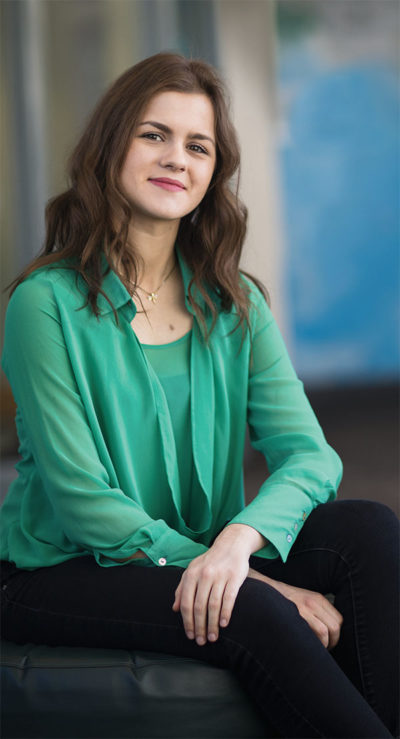
Photo: Tom Kates
Mara Steiu ’20
How did you become interested in entrepreneurship? My mother knew about my frustration with the fact that financial education is not the norm in Romania, and that I saw an opportunity to innovate on this topic. She encouraged me to apply to a startup competition in Cluj, a city nearby. I applied with an idea for a computer and smartphone game that combines finance and entrepreneurship, and my team won. We were all teenagers, up against people who were between 25 and 30 years old. I thought, maybe that’s a sign that I should continue with entrepreneurship. I really loved it.
What spurred iXperiment? While working on the financial education game, I had a chance to work with a lot of students from Romania. I realized that they also had innovative ideas for entrepreneurial ventures. But most of the entrepreneurial initiatives in Romania are for young adults, like university graduates. So I thought, what if I create an equal system for high school students? I took a gap year before coming to Babson to get iXperiment started, and I was mostly alone in the beginning. I had to do marketing and fundraising, find volunteers, and create a curriculum, which I did with support from my mentor and other expert entrepreneurs. Now we have an amazing team that does a great job. We offer students the opportunity to experience entrepreneurship and to decide for themselves if they want to do it.
What keeps you busy at Babson? I’m a tutor at the Learning Center, and I also take a class at Wellesley College. I do computer programming there. I’m trying to combine business, education, and technology, because my long-term goal is to use technology to innovate outdated education systems in places like Eastern Europe.
You were a ballroom dancer? My parents sent me to ballroom dancing since I was 7 or 8. I loved it. I did it for a long time—about eight years. Me and my partner were national champions in our category back in 2008. It taught me a lot about persistence and discipline, and it was physically hard. I miss it.—Donna Coco
]]>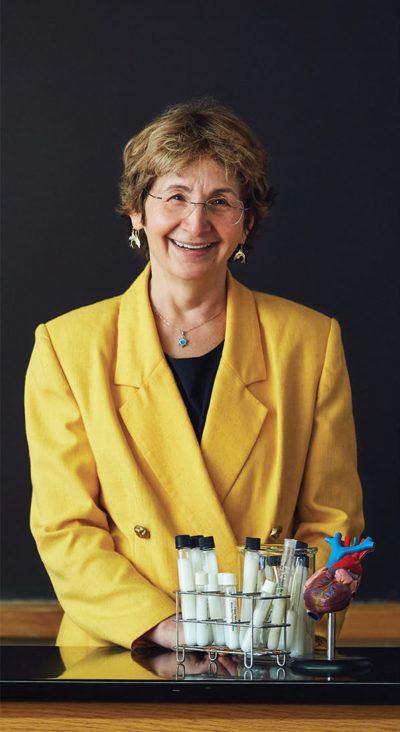
Photo: Pat Piasecki
What is your approach to nutrition? Be flexible. I used to do weight-loss groups when I worked as an out-patient dietician, and people would say, “Oh, I was bad.” I would say, “Did you rob a bank?” They’d say, “No, I had cake at my nephew’s bar mitzvah” or something. That’s not bad. Foods aren’t inherently good or bad. If you’re a diabetic whose blood sugars are tanking, you need candy. It’s the situation. One of the things my students hear over and over again is it’s the dose that makes the poison. It’s not what you eat; it’s how much you eat.
What attitudes trouble you the most? I’ve become interested in something called orthorexia, which is when healthy eating becomes unhealthy. I’ve added it to my classes, because I think people are becoming obsessed with food. They’re not enjoying it anymore. There’s nothing wrong with wanting to take care of yourself. It’s when you won’t go out to eat because it might not be the right food that it starts to interfere with life.
What’s your goal when preparing a meal? For it to taste good. I don’t deprive myself of things.
Do you have a favorite meal? I love when my husband makes tortillas with beans and eggs and chicken, and he sautes the tortillas and folds them over, and then we have them with apple sauce. There’s something about apple sauce that I really like. The taste in my mouth is like a party.
What do you like to do? Travel. We’ve been to the Galapagos. We went to Antarctica. People think they’ve seen icebergs in Alaska, but you haven’t seen anything until you’ve been to Antarctica. We’re going to the Baja Peninsula in March to watch the great whale migration.
Do you have a hidden talent? No, I’ve been told that everything is out there—I have no secrets. Lately, after this election, I’ve been really sad. But usually what I try to do when I’m in a new situation is find what makes somebody smile, because then I can connect with them. You know, make them laugh. A stand-up nutritionist, as my husband says.—DC
]]>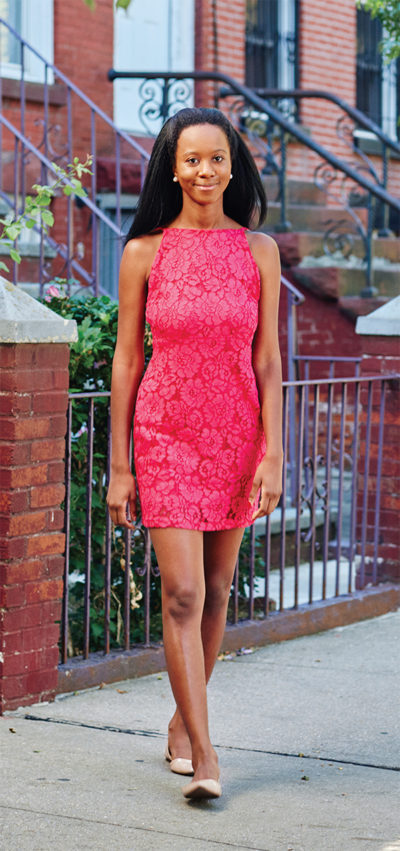
Photo: Winnie Au
Nitiya Walker ’14
In high school, a friend’s mother taught Nitiya Walker ’14 a strategy for filling out award applications. The advice helped Walker win a Women of Distinction award from the Girl Scouts and a Posse Foundation scholarship to Babson. Wanting to share this knowledge with others, Walker founded Seeds of Fortune, which helps minority women in New York City apply for college scholarships. Three girls attended the inaugural program, which Walker launched the summer before her senior year at Babson. Since then, she has added career and financial management skills to the nonprofit’s offerings and developed plans to extend the program nationally. Now about 30 girls are in the program, and its class of 2016 earned more than $1 million in scholarships and grants.
Where did you grow up? I grew up in Brooklyn. In the ’90s, Brooklyn had a lot of creativity and small-business owners. My dad owned a black theater in Manhattan, so I was there a lot. It was called the Ujamaa Black Theater. It put on dramatic plays, written and directed by my father, that told the black experience. I was in some of them.
Why come to Babson? I was a vocal major in high school, but I always loved business and entrepreneurship, too. I realized that either I would become Beyonce or do something else, and I knew I didn’t want to be a starving artist. I experimented with candy selling when I was in high school and made $1,000 a month.
What would be your dream job? I love the entertainment industry, so I work in marketing for Viacom. I really enjoy integrated marketing and would like to see where that journey takes me. But some day, maybe in my 40s, I think I’d like to work for the White House Council on Women and Girls. I learned about it when I was invited to the White House’s United State of Women Summit this June. About 5,000 women doing amazing things in their respective fields were invited. Oprah interviewed Michelle Obama about trailblazing the path for women. Every woman I ever wanted to meet was there.
A summit take-away? One idea can have an impact and change lives if you have the tenacity to stand up and be the leader.
A favorite entertainer? Maybe Kanye West. I know a lot of people think he’s a crazy man. But as outlandish as his vision is at times, the fact that he has the capacity to dream big and bold and doesn’t care about opinions and doesn’t let them deter him—that kind of confidence breeds success.—Donna Coco
]]>